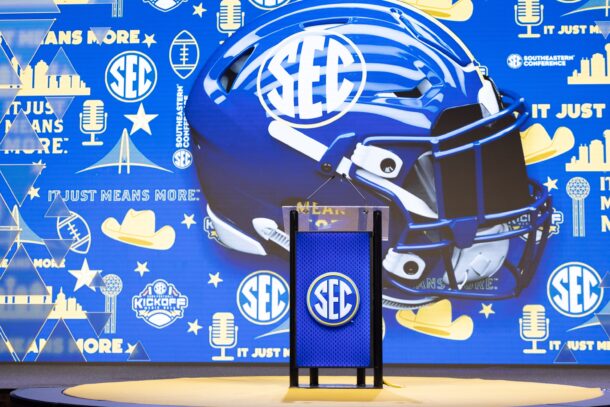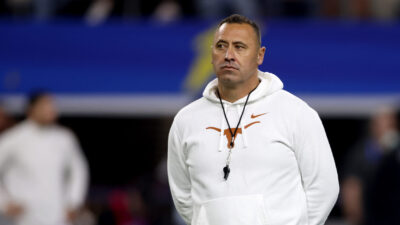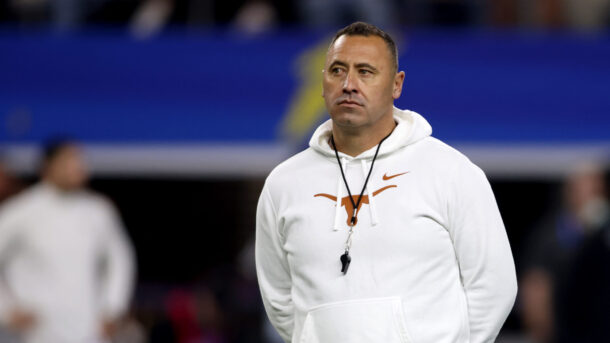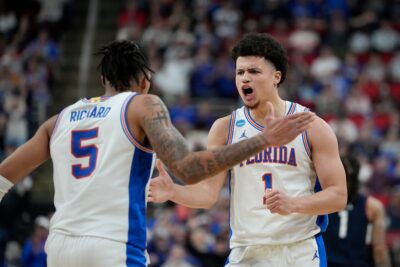Ad Disclosure

History lesson: Ranking the SEC’s No. 1 overall NFL draft picks
By Tom Brew
Published:
The 2016 NFL Draft is right around the corner and the Tennessee Titans are on the clock. There’s a chance – some say a real good chance – that the Titans will select Ole Miss offensive tackle Laremy Tunsil with the first pick when April 28 rolls around. If so, he’ll join a long list of SEC players who have been selected first overall.
Since the NFL drafted started in 1936, there have been 17 SEC players that have gone No. 1. Many of them have been great, most notably the Manning brothers, Peyton from Tennessee and Eli from Ole Miss.
Others have been dismal flops, like LSU’s JaMarcus Russell and Kentucky’s Tim Couch.
Some were drafted first overall but never played for the teams that drafted them. They still went on to great pro careers, players like Auburn’s Bo Jackson and LSU’s Billy Cannon.
So who’s been the best pros of the bunch? Here are our rankings of the SEC’s 17 first-overall picks, in order by the successes they’ve had in the professional ranks:
1. Tennessee’s Peyton Manning to Indianapolis (1998)
Peyton Manning arguably is the greatest quarterback in NFL history, and if he’s not, he’s on a very short list. Manning won Super Bowls, including this year with the Denver Broncos, and has been a five-time NFL MVP. He spent most of his career with the Indianapolis Colts and holds dozens of NFL records, including passing yards and wins by a quarterback. He’s a lock Hall of Famer in 2021.
2. Ole Miss’ Eli Manning to New York Giants (2004)
San Diego drafted Eli Manning, but he’d made it known he refused to play for the organization. The Chargers traded him a few minutes later for Philip Rivers and draft picks. He’s been an exceptional pro with the Giants, winning two Super Bowls. Manning and his father, Archie, were criticized for the orchestrated draft-day trade to get to New York but it worked out well. Manning is on pace to be a Hall of Famer as well. He has thrown for more than 44,000 yards and has an exceptional 8-3 record in NFL playoff games.
3. Georgia’s Charlie Trippi to Chicago Cardinals (1945)
Trippi played nine seasons in the NFL and made two Pro Bowls, and was one of the most versatile players in NFL history. He was a running back mostly, but also started at quarterback for two years during his career. He won an NFL title in 1947, becoming famous for wearing tennis shoes on an icy field for better traction. He was elected to the Pro Football Hall of Fame in 1968. He is the only Hall of Famer in history to rush for more than 1,000 yards, pass for more than 1,000 and accumulate more than 1,000 receiving yards. Trippi is the only SEC player who was a first-overall pick and is in the NFL Hall of Fame. That will change soon with Peyton Manning’s retirement, but for now it’s just Trippi.
4. LSU’s Billy Cannon to Los Angeles Rams (1960)
Cannon played 11 years in the AFL and NFL and made two Pro Bowls. He was drafted by the Rams, but the NFL and AFL were at war. After a long legal battle, Cannon played with the AFL’s Houston Oilers instead. He won two AFL championships with the Oilers (1961-62) and was the title game MVP both years. He also led the league in rushing in 1961. Cannon later played with the Raiders and Chiefs as a tight end. He won a third AFL title with the Raiders in 1967, but lost Super Bowl II to the Green Bay Packers. He had more than 6,000 yards from scrimmage and scored 111 touchdowns.
5. Auburn’s Bo Jackson to Tampa Bay (1986)
Jackson warned the Bucs not to take him before the draft, but they did it anyway. Jackson stayed true to his word and played professional baseball instead. He came back to the NFL with the Oakland Raiders. He played for the Raiders for four seasons from 1987 to 1990, rushing for 2,782 yards and making a ton of highlight reels. He’s one of only a handful of players to be named an all-star in multiple sports. His baseball career was exceptional as well (141 home runs), and he’s gone down as one of the great two-sport athletes of all time.
6. Vanderbilt’s Bill Wade to Los Angeles Rams (1952)
Wade played 13 seasons in the NFL and made two Pro Bowls. Wade played seven years with the Rams and led the NFL in passing in 1958. He was traded to the Chicago Bears and led them to a World Championship in 1963. Wade just passed away this month in Nashville.
7. Auburn’s Cam Newton to Carolina (2011)
Newton had plenty of critics when he was drafted first overall, with many thinking he would never win big as a quarterback in the NFL. He proved everyone wrong this year, leading the Panthers to the Super Bowl and being named the league’s Most Valuable Player. His spot in these rankings is sure to change for the better in future years.
8. Georgia’s Frank Sinkwich to Detroit (1943)
The halfback Sinkwich played four seasons in the NFL. The 1942 Heisman Trophy winner first served time in the Marines in World War II before joining the Lions. He had two great years, winning the NFL Most Valuable Player award in 1944, but a knee injuries derailed the rest of his career. He was selected to the College Football Hall of Fame in 1954.
9. Georgia’s Matthew Stafford to Detroit (2009)
Stafford has put up great numbers at Detroit and had a solid career. All that’s been lacking is success in the postseason. He’s thrown for nearly 26,000 yards and 163 TDs in seven seasons and has proved to be very durable, playing all 16 games for five straight years now. But he’s only led his team to the playoffs twice (2011, 2014) and both times the Lions lost their first game.
10. South Carolina’s Jadeveon Clowney to Houston (2014)
Clowney isn’t wearing the bust label yet because it’s too early, but he hasn’t done much in his first two years in the league. Injuries derailed his 2014 season and this year he had only 4.5 sacks playing opposite NFL great J.J. Watt on the Houston Texans’ defensive line. Great things are expected of Clowney, but we haven’t seen them yet.
11. Auburn’s Tucker Fredrickson to New York Giants (1965)
Fredericton played six seasons in the NFL and made one Pro Bowl, in his rookie year. He played until 1971 when his career was ended by a knee injury. He was elected to the College Football Hall of Fame in 1994.
12. Tennessee’s George Cafego to Chicago Cardinals (1940)
The halfback Cafego played four seasons in the NFL, but much of his career was interrupted by his service in the military during World War II and he bounced around the league without much fanfare. Afterward, he was an assistant coach at the college level for many years – including 30 years at Tennessee (1955-84) – and was even the head baseball coach at Tennessee from 1958-62.
13. Auburn’s Aundray Bruce to Atlanta (1988)
Bruce played 11 years in the NFL but never reached elite status. He never made a Pro Bowl but was a key contributor with Atlanta during its 1991 playoff run, even playing some tight end on offense. The defensive end started only 42 games during his NFL career.
14. Kentucky’s Tim Couch to Cleveland (1999)
Couch was a flop in Cleveland, and considered one of the draft’s all-time busts. He lasted only five years with the Browns, but has been defended by some as being in the wrong place at the wrong time, an average QB on a horrible expansion team. He did have some highlights. He throw for more than 11,000 yards, but threw more interceptions (67 to 64) than touchdowns.
15. Georgia’s Harry Babcock to San Francisco (1953)
Babcock played only three seasons in the NFL. He played both ways for the 49ers, making 16 catches as a split end.
16. Alabama’s Harry Gilmer to Washington (1948)
Gilmer, a quarterback, was with Washington from 1948-54 and then spent two years with Detroit before retiring. He started only 10 games in his career, but has a dubious distinction of going 0-10 in those starts, according to pro-football-reference.com. He was elected to the College Football Hall of Fame in 1993.
17. LSU’s JaMarcus Russell to Oakland (2007)
Russell is another on the Mount Rushmore of draft-day busts. He never amounted to anything at Oakland – he played three years there and won only seven games – and has struggled to stay out of trouble ever since. In 25 starts, he threw only 18 TD passes and 23 interceptions. Because of his physical tools – he was 6-foot-6 and 265 pounds in his playing days – most people thought he would get a second chance but it never happened.
Tom Brew is an award-winning journalist and author who is covering SEC football for Saturday Down South.




